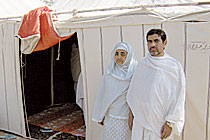ARAFAT, 10 January 2006 — Ignorance of the law is no excuse. This was sadly illustrated to two Indian pilgrims from Gujarat. In their luggage they had 250 grams of poppy seeds (khaskhas) which resulted in their being arrested. Neither knew that the substance was banned in Saudi Arabia and both said that they had brought it for use in cooking while they were here.
In some parts of India, poppy seeds are used in cooking a number of dishes. Though the two pilgrims — Siraj Fareed Muhammad and his aunt, Haneefa Yusuf — arrived with a group of pilgrims, they will not be leaving with the group. Unfortunately, they will remain here until the police inquiry into their case is completed, said Indian Consul General Dr. Ausaf Sayeed. The two were arrested on Dec. 31 shortly after landing at the Haj Terminal in Jeddah.
Siraj explained, “We did not know that khaskhas is banned in Saudi Arabia; we normally add it to food such as halwa. It was in a box in our luggage and when the customs officials found it and opened it, my passport and my aunt’s were seized. We were held at the airport and handed over to the police.”
Siraj manages a travel agency in India and came for Haj with 40 other pilgrims. “I have performed Haj four times and this is my fifth. I never had any problem. This time, however, since my aunt was coming with me, I thought we would do some cooking and so I put the khaskhas into the luggage. In our country, this is a normal substance used in cooking and I had no idea that it would put us in jail,” he said.
The two pilgrims spent eight days in prison but were released on the intervention of the consul general, only to perform Haj. They have been handed over to the South Asian Establishment which gave a written undertaking to return them to the authorities after Haj.
“They were brought to the Indian Haj office in Mina at 4 a.m. today by the South Asian Establisment,” said Dr. Suhel Ajaz Khan, Haj consul at the Consulate General of India. “We are providing them all assistance to enable them to perform Haj and they are happy about that,” Khan said.
Both Siraj and his aunt praised Saudi officials for the treatment they got during their detention. “We were treated well and with sympathy by the police and other officials; we have been well taken care of,” they said.
After their arrest, the consul general wrote to Saudi officials asking them to consider the case sympathetically.
The consul general said a proper orientation program was needed to ensure that such things do not happen in future. He was optimistic that the two would be freed after the investigations. “They must cooperate with Saudi officials. That is the only way to prove their innocence. Giving them permission to perform Haj is a good sign and I am hopeful that they will be sent home after Haj,” he said.
Dr. Ausaf praised the Saudi police as well as the head of the South Asian Establishment, Adnan Amin Katib, for their cooperation.


